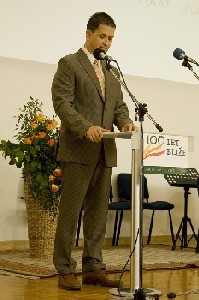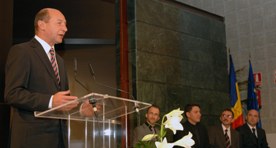World headquarters eyes hiring freeze, pledges prudence
The financial situation of the Seventh-day Adventist Church is under pressure from the turbulence rocking world financial markets, church financial officials report, but world church leaders are taking what they call prudent steps to manage during the crisis.
On October 13, the Annual Council of the Seventh-day Adventist world church voted to accept a 2009 budget based on 2007's income levels, along with a resolution allowing the world church to make interim adjustments to the budget between the Manila business session and the Spring 2009 business meeting, which is expected to be held at Adventist church-owned Oakwood University in Huntsville, Alabama (USA).
Robert E. Lemon, treasurer of this Christian World Communion, addressing Annual Council delegates, noted that tithe received by the world church in 2007 amounted to U.S. $1.78 billion, an 11 percent increase over 2006's $1.6 billion. Worldwide mission offerings for 2007 totalled U.S. $63 million, approximately a 10 percent rise over U.S. $58 million received in 2006.
Though much of the increase has come from increased giving in local currencies, Lemon said a "major portion" of the increase is attributed to conversion into the U.S. dollar, which has weakened.
Tithe in the church's North American region increased about 4 percent; the NAD also recorded an approximately 2 percent increase in mission giving, Lemon reported.
Commenting on the financial situation and the need to be able to adjust the church's budget as conditions shift, Lemon said the world church operates in a way that's different from some other organizations.
"Our budgets are not built on the dollars we have," Lemon noted, "but on the blessings we anticipate." This means "we don't know what effect the markets will have" on future income, he said.
In light of this, church leaders are already making moves to economize, Lemon said. "We will be holding off as long as we can" on filling vacancies at the world headquarters, he noted, though the hold is "not a total freeze" on filling vacancies that might occur. Similarly, the voted approval of a 3 percent increase in appropriations included in the 2009 budget might have to be delayed -- or even eliminated -- depending on economic realities.
A major portion of the October 13 Annual Council discussion surrounded the world church's operational funds equity investments. Some of these have taken a 30 to 40 percent "hit" in recent days, but they represent a very small portion of overall operating funds for the world church. Associate treasurer Roy Ryan said the purpose of most equity investments is to generate sufficient returns to compensate for inflation and to preserve purchasing power. Ryan said it is not prudent to attempt to "time the market."
World church president Jan Paulsen agreed, saying the Adventist church "is as conservative as possible" with its investments.
Along with the budget modification resolution, other actions taken include a vote to raise, at a minimum of 1 percent annually, the working capital reserves for the world church from 40 to 50 percent of a year's unrestricted income. Another move would grant U.S. $1 million to the South Africa Union, as well as loan an additional U.S. $2.5 million, repaid over 10 years, to sufficiently fund the Union's pension obligations as required under South African law. The move, Southern Africa-Indian Ocean region president Paul Ratsara said, would finally unify the two pension plans of two former unions.
An additional motion gives the world church the ability to allocate as much as U.S. $3.5 million to complete construction of the Adventist University of Africa, a graduate school being constructed in Nairobi, Kenya. By making that allocation now, Lemon said, it would allow construction to proceed in a better fashion.
Perhaps the most poignant moment came when appreciation was expressed for the grant of U.S. $300,000 to the Southern Africa-Indian Ocean region for use in Zimbabwe, which is facing a rate of hyperinflation unseen since the days of Germany's Weimar republic.
Norman Maphosa of Adventist church-owned Solusi University in Zimbabwe expressed his thanks to the world church for this grant, noting that the "situation is deteriorating" in his country.
In other financial news, church leaders said the "extraordinary tithe" reported earlier as the proceeds from a family's sale of a private business has reached just under U.S. $102 million, to which another U.S. $2.8 million in interest has been added. Of the U.S. $104 million available for allocation some U.S. $75.7 million has been allocated to world regions, as well as church institutions and programs aimed at world evangelism. Another U.S. $15.7 million is reserved for future allocation, leaders said.


